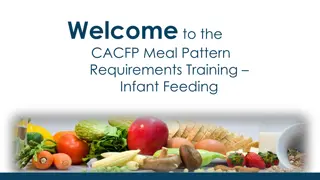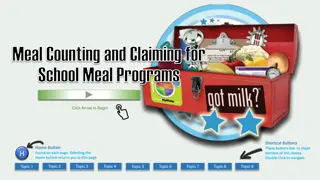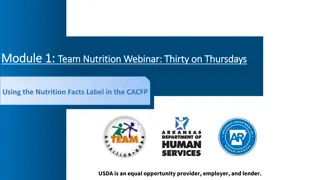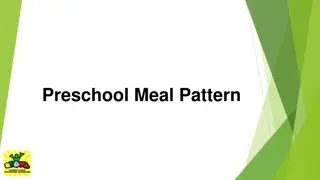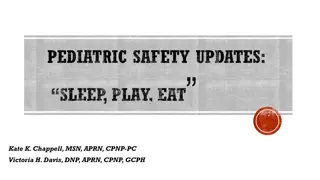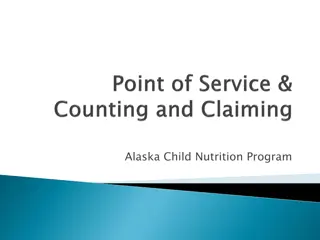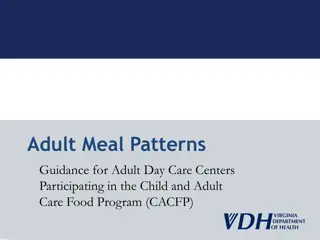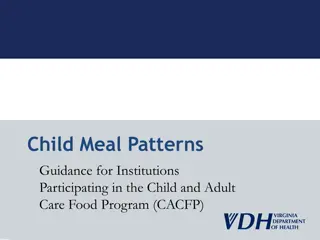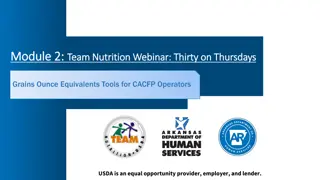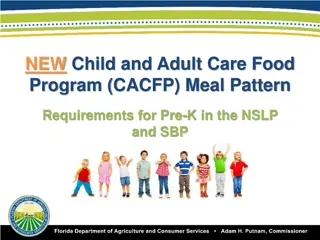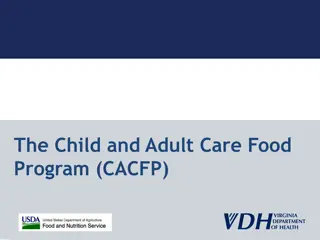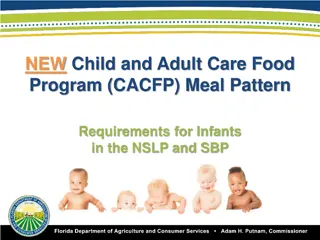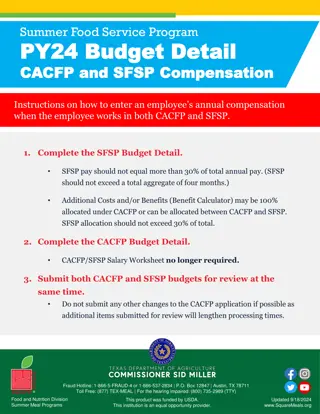CACFP Infant Meal Program Requirements
The Child and Adult Care Food Program (CACFP) outlines specific requirements for serving infants, including providing iron-fortified infant formula, cereal, and developmentally appropriate foods. Training objectives cover meal components, formula choices, and defining "developmentally ready." Centers must offer infant meals and inform parents of formula options. Medical statements are required for non-compliant formulas. Developmental readiness determines feeding practices for infants.
Download Presentation

Please find below an Image/Link to download the presentation.
The content on the website is provided AS IS for your information and personal use only. It may not be sold, licensed, or shared on other websites without obtaining consent from the author.If you encounter any issues during the download, it is possible that the publisher has removed the file from their server.
You are allowed to download the files provided on this website for personal or commercial use, subject to the condition that they are used lawfully. All files are the property of their respective owners.
The content on the website is provided AS IS for your information and personal use only. It may not be sold, licensed, or shared on other websites without obtaining consent from the author.
E N D
Presentation Transcript
Requirements for Serving Infants on the Child and Adult Care Food Program (CACFP)
Infants on the CACFP Training Objectives List meal components for each stage of infancy Describe requirements regarding the Infant Formula Choice Form Define how the term "developmentally ready" is applicable to the infant meal pattern Know which conditions must be met in order to claim for infant meals
Infants on the CACFP Definitions Infant: A baby from birth through 11 months (any child less than one year of age) Infant Formula: Any iron fortified infant formula (IFIF), including soy-based, intended for dietary use solely as a food for normal, health infants served in liquid state according to manufacturer s recommended dilution **To serve/claim reimbursement for formulas that do not meet this definition, a medical statement is required.
Infants on the CACFP Definitions Infant Cereal: Any iron-fortified infant cereal (IFIC) specially formulated for and generally recognized as cereal for infants that is routinely mixed with breast milk or iron-fortified formula prior to consumption. Developmentally Ready: An infant s developmental readiness determines which foods should be fed, what texture the food should be and which feeding styles to use. Infants develop at varying rates When an infant is developmentally ready, new foods must be offered to them
Infants on the CACFP Requirements If the center serves infants, infant meals MUST be offered. At least one type of iron-fortified infant formula must be offered. Iron-fortified infant cereal and other developmentally appropriate foods for infants (fruits/vegetables and meat/meat alternatives) must be offered.
Infants on the CACFP Infant Formula Choice Form A center must inform parents in writing that an iron- fortified infant formula (including the specific name) and foods for infants are provided. Parent or legal guardian may accept or decline formula and/or infant foods provided. A signed Infant Formula Choice Form indicating their decision must be kept on file. VDH approved formulas: http://www.vahealth.org/DCN/Publications/Files /PDFs/Approved%20Formulas.pdf
Infants on the CACFP Infant Meal Pattern: Birth-3 Months Through 3 months, the only meal component that is required is breast milk or iron-fortified infant formula (4-6 ounces) Infant meal times may vary depending on the individual infant, and they should be fed on demand Parent/guardian can provide IFIF or breast milk and the center can claim the meal
Infants on the CACFP Infant Meal Pattern: 4-7 Months Breakfast 4-8 fl oz IFIF or breast milk 0-3 T Iron-fortified Infant Cereal (IFIC) when developmentally ready Lunch/Supper 4-8 fl oz IFIF or breast milk 0-3 T IFIC and 0-3 T fruit and/or vegetable when developmentally ready Snack 4-6 fl oz IFIF or breast milk
Infants on the CACFP Infant Meal Pattern: 4-7 Months If, according to the parent/guardian, the infant is not developmentally ready to receive IFIC, the center can still claim for the meal (even when the parent/guardian is providing the breast milk or IFIF). If the parent thinks that the child is developmentally ready to start receiving solid foods, then the center must provide them in order to claim the meal.
Infants on the CACFP Infant Meal Pattern: 8-11 Months Breakfast 6-8 fl oz IFIF or breast milk 2-4 T Iron-fortified Infant Cereal 1-4 T fruit and/or vegetable Lunch/Supper 6-8 fl oz IFIF or breast milk 1-4 T fruit and/or vegetable 2-4 T Iron-fortified Infant Cereal and/or meat alternate
Infants on the CACFP Infant Meal Pattern: 8-11 Months (cont.) Snack 2-4 fl oz IFIF, breast milk or 100% fruit juice Bread and/or crackers--when developmentally ready
Infants on the CACFP Important Tips on Juice Full strength (100%) juice is reimbursable only as a snack for 8-11 month old infants Juice cannot be diluted or watered down Juice should only be served to infants when they are able to drink it from a cup No fruit drinks, fruit punch, soda or sweetened drinks are reimbursable
Infants on the CACFP Infants 8-11 months Not Eating IFIC: Options Talk with parents and ask permission to offer IFIC at breakfast since it is required Do not claim reimbursement for the child s breakfast Request a medical statement stating the child is eating all table foods and that it is appropriate
Infants on the CACFP Infants 8-11 Months Not Eating IFIC When a medical statement indicating appropriateness of all table foods is available: The infant may be counted in regular meal counts and production records. Infant meal records need not be completed; however The complete meal pattern must be met for each meal that is to be claimed (as for any child ages 1-12 on CACFP)
Infants on the CACFP Transitioning from IFIF to Whole Milk Typically, infants transition from formula to whole milk at 12-13 months After 13 months of age, IFIF is no longer a reimbursable component of CACFP unless there is a medical statement on file












